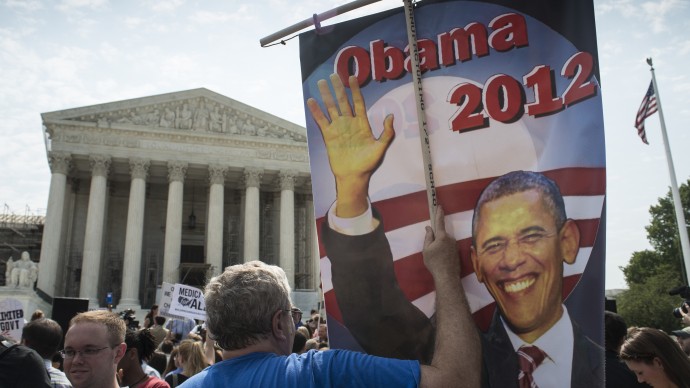
(MintPress) – In what was marked as a victory for President Barack Obama, the Supreme Court upheld the Affordable Care Act (ACA) after months of deliberation Thursday, ruling the individual mandate was constitutional under the Taxing Clause, setting in motion the implementation of the law in 2014.
The court ruled 5-4 on the issue, with Chief Justice John G. Roberts Jr. providing what many saw as a swing vote.
Other portions of the ACA, including policies that would mandate insurance companies allow children to stay on their healthcare plans through the age of 26, and one that would not allow insurance companies to deny coverage based on pre-existing conditions, will also remain in the law. The provision that will be nixed relates to expansion of Medicaid within states, ruling states that do not implement the full expansion will not be cut off from federal funds completely.
The decision was a milestone in a heated debate that has ensued throughout the nation since the passage of the ACA in 2010, with those within the Republican party claiming the individual mandate was an intrusive overreach of government that would increase the deficit. Those in favor of the ACA said it provided a more affordable option for insurance, creating a more level playing field and providing those unable to pay for health insurance with aid through state programs.
While the Supreme Court has issued its ruling, the House is likely to introduce legislation before the November elections in an effort to repeal the law. But even a House victory will not likely lead to change, as a Democratically-led Senate is not expected to concur in what has become a politically charged debate.
The case was heard by the High Court after 26 states, along with business organizations, challenged the ACA, with states concerned that noncompliance with the new law would subject states to expand Medicaid coverage or risk losing federal funds.
Individual mandate considered constitutional as a tax
While the initial argument by the government, in terms of the individual mandate, was that those who did not purchase health insurance would be subject to a penalty, the Supreme Court found it reasonable to assume that the ‘penalty’ could be looked at as a tax, largely because the price was not high enough to compare to the price of healthcare and because it would be collected by the Internal Revenue Service (IRS).
“The most straightforward reading of the individual mandate is that it commands individuals to purchase insurance. But, for the reasons explained, the Commerce Clause does not give Congress that power,” the High Court opinion states. “It is therefore necessary to turn the Government’s alternative argument: that the mandate may be upheld as within Congress’s power to ‘lay and collect taxes.’”
Therefore, the Court found that failing to purchase insurance would not necessarily be considered unlawful.
“Neither the Affordable Care Act nor any other law attaches negative legal consequences to not buying health insurance, beyond requiring a payment to the IRS,” the opinion states.
According to the Kaiser Foundation, that tax will be increased on a sliding scale, starting at $95 per year in 2014, increasing to $325 in 2015 and $695 in 2016 — or 1 percent of taxable income in 2014, 2 percent in 2015 and 2.5 percent in 2016. After 2016, the organization points out that penalties will be assessed based on cost of living.
Romney, Obama paint paths for future
In an announcement following the Supreme Court decision, Republican presidential frontrunner Mitt Romney promised Americans his first order of business, if elected president, would be to repeal the Affordable Care Act.
“What the court did not on its last day in session, I will do on my first day I’m elected president of the United States,” Romney said, “and that is, I will act to repeal Obamacare.”
Romney pointed out in his speech that the High Court did not rule on whether the ACA was good for the American people, a point he used to highlight his claim. It’s an issue addressed in the Supreme Court decision — but it was never in question that the court would look at the effectiveness of the law, only on whether or not it upheld a test of constitutionality.
“We do not consider whether the Act embodies sound policies,” the decision states. “That judgment is entrusted to the Nation’s elected leaders. We ask only whether Congress has the power under the Constitution to enact the challenged provisions.”
Romney, who implemented a similar healthcare program in Massachusetts, dubbed “Romneycare”, has campaigned on a platform of allowing states to come up with their own programs. While not specifically laying out his proposal, he said in his Thursday speech that he supports provisions that prohibit insurance companies from denying coverage based on pre-existing conditions, and that he supports a comprehensive program that lowers costs for Americans.
“We have to assure that we do our very best to help each state in their effort to assure that every American has access to affordable healthcare,” Romney said.
Romney’s statements are shared by the president, who, in addressing the nation following the ruling, said Americans would see lower costs of health insurance, as a result.
“Today’s decision was a victory for people all over this country whose lives will be more secure because of this law and the Supreme Court’s decision to uphold it.”
First, if you are among the more than 250 millions who already have health insurance, you will keep your health insurance, this law will only make it more secure and more affordable.
That’s a claim those within the Romney campaign directly challenge, with Romney citing in his speech that, under the ACA, 20 million people would lose their current health insurance. Similar claims have been made on the campaign trail by various Conservative organizations. Politifact.com, a fact checking service, has analyzed this particular issue, pointing out that data is based on a Congressional Budget Office study, but that it does not accurately reflect statements that 20 million will automatically be without health insurance.
Politifact.com indicates that such statements are based on estimates and scenarios presented by the CBO, which accounts for those who may willingly switch to another form of coverage, which they would do be necessarily forced to do. Politifact.com also points out that 9 million who currently do not have employer coverage will obtain it through provisions in ACA.


